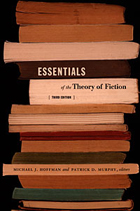
Contributors. M. M. Bakhtin, John Barth, Roland Barthes, Wayne Booth, John Brenkman, Peter Brooks, Catherine Burgass, Seymour Chatman, J. Yellowlees Douglas, Rachel Blau DuPlessis, Wendy B. Faris, Barbara Foley, E. M. Forster, Joseph Frank, Joanne S. Frye, William H. Gass, Henry Louis Gates Jr., Gérard Genette, Ursula K. Heise, Michael J. Hoffman, Linda Hutcheon, Henry James, Susan S. Lanser, Helen Lock, Georg Lukács, Patrick D. Murphy, Ruth Ronen, Joseph Tabbi, Jon Thiem, Tzvetan Todorov, Virginia Woolf

Selections from: M. M. Bakhtin, John Barth, Roland Barthes, Wayne Booth, Peter Brooks, Seymour Chatman, Rachel Blau DuPlessis, Suzanne C. Ferguson, Barbara Foley, E. M. Forster, Joseph Frank, William Freedman, Norman Friedman, Joanne S. Frye, William H. Gass, Henry Louis Gates Jr., Gérard Genette, J. Arthur Honeywell, Linda Hutcheon, Henry James, Susan S. Lanser, Mitchell A. Leaska, George Levine, David Lodge, Georg Lukács, Gerald Prince, Patrocinio P. Schweickart, Tzvetan Todorov, Lionel Trilling, and Virginia Woolf

While friendship was often discussed by the ancients, moderns have had much less to say on the topic. Leading us into a dialogue with the ancients, the contributors offer a series of far-reaching encounters. Nietzsche debates the meaning of friendship with Socrates; Horatio fulfills the ancient desideratum of the “true friend” in telling Hamlet’s story; and philia becomes the core of a radical ethic through a reconstruction of Marx’s Epicurean ideals. Friendship is also analyzed as the model of a non-narcissistic psychology, on the one hand, and of a “mafia of idealists”—the French Resistance—on the other. Moreover, milieus of friendship are revealed as a unique crucible of creativity for the Benjamin-Bloch cohort in 1920s southern Italy, for Wittgenstein and his Cambridge followers in the 1930s, and for American jazz musicians of the 1950s.
Contributors. Dwight Allman, Fabio Ciaramelli, Marios Constantinou, John Ely, Agnes Heller, Clara Gibson Maxwell (with Ornette Coleman), Peter Murphy, Louis Ruprecht Jr., Jean-Pierre Vernant
READERS
Browse our collection.
PUBLISHERS
See BiblioVault's publisher services.
STUDENT SERVICES
Files for college accessibility offices.
UChicago Accessibility Resources
home | accessibility | search | about | contact us
BiblioVault ® 2001 - 2024
The University of Chicago Press









